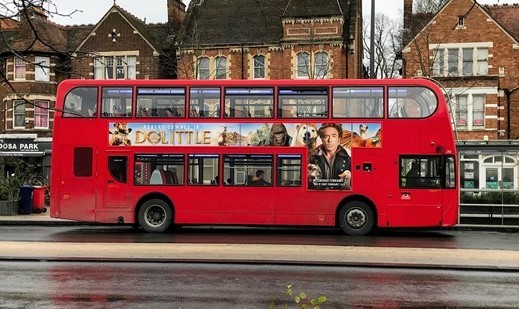Literary adaptations have always been a major source of material for the film and television industry. In the early days of cinema the first feature films drew on the classics and popular fiction of the time. Alice in Wonderland, Robinson Crusoe and Sherlock Holmes all came to the silent screen in the early 1900s.

The century-old practice of adapting books for the screen is still thriving today. In the last few months alone new versions of Little Women, Emma, Doctor Dolittle and Call of the Wild have been released in movie theatres. The TV schedules are also full of literary adaptations. UK free-to-air television has recently broadcast new versions of Les Miserables, His Dark Materials, Normal People, Dracula and War of the Worlds.
The H G Wells story War of the Worlds was published in 1898 and is considered a classic of the science fiction genre. It created many of the standard tropes of the alien invasion genre – invaders with superior technology and overwhelming force, the human race on the brink of extinction, a fatal weakness in the invaders that eventually saves the day. The BBC adaptation should have been great entertainment. Why then was it so deeply unsatisfying?
I should start by saying that I’m a fan of literary adaptations. That’s especially true when I’ve enjoyed reading the book. And I’m not against an adaptation departing from the source material. Which is probably just as well, because they rarely remain true to the original. There are sound reasons for this. What works in print doesn’t always translate well to the screen. And, because of their length, novels often have many characters and complex interweaving storylines. They can’t be adapted to a more economical script without losing something along the way.
An adaptation that remains extremely close to the original is the 1995 BBC production of Pride and Prejudice. The Andrew Davies screenplay captures Austen’s story perfectly and the cast are well matched to their characters. The production drew on the original, enhanced it, and came up with something that’s almost better than the book.
Literary adaptations can sometimes make significant changes and still remain successful in their own right. Ice cold in Alex, set during World War Two, concerns the journey of three soldiers and a nurse as they travel across the desert towards Alexandria. Captain Anson, an alcoholic who is traumatised by war, realises that the survival of the whole party depends on him. He resolves that his next drink will be an ice cold beer when the party has arrived safely in Alexandria.
The script mostly follows the book closely. In many scenes the dialog is a word-for-word copy. The only significant departure is the romantic relationship between Anson and Nurse Diana Murdoch. In the 1958 film, John Mills and Sylvia Syms somehow make this work. Like many productions of the time, the film seems dated now. But it tells a good story and is a good film.
When you read the book however an alternative story emerges. In the novel, Nurse Murdoch develops a relationship with Warrant Officer Pugh. Even in the film they spend more time together than she does with Anson. The book reveals one of the problems in the film. How could anyone, in the space of a few tense days, fall in love with a man who is clearly on the verge of a nervous breakdown. The book also introduces the issue of class difference, something that is missing entirely from the film. The literary adaptation works but it’s in spite of rather than because of the major alteration to the story’s romantic relationship.
War of the Worlds goes even further in making changes to its source material. At first glance it looks as though it intends to remain true to the original. It’s set in the early 20th century in Woking, the story’s original location, and within a decade of the book’s time period. But right from the start there’s something about the relationship between the main characters that doesn’t seem to fit with the times.
The book’s protagonist is male. The original story is, after all, firmly entrenched in its late-Victorian setting. The TV adaptation has a male character who is estranged from his wife and living with another woman, Amy. It’s an unusual domestic situation for 1908 and entirely absent from the book. Amy quickly emerges as the adaptation’s main character. In many ways she is a woman of her times. By which I mean, a woman of the 21st century. Adaptations often reflect the times when they were made. But the insertion of Amy, a very modern woman, into a story set a century ago jars with the rest of the storyline. It would have been far easier to set the story in the current day, a solution than most other adaptations of War of the Worlds have resorted to.
Perhaps the change in lead character wouldn’t have mattered if the adaptation preserved the other elements of the original. But after episode one it settles into a bleak, depressing, dystopia. There seems to be nothing much for the characters to live for. And not much reason for viewers to persevere either. By the third episode in this grim telling, you almost wish the Martians would land and put us all out of our misery.
So what makes a literary adaptation succeed or fail? Reading a novel is an intensely personal experience. Each reader creates their own version of the world encapsulated in the book. Film makers will inevitably disappoint someone.
They can try to mimimise the disappointment by considering the following: Does the adaptation capture the essence or milieu of the book? Is it broadly faithful to the original without being slavish? Has it reinterpreted the original and given it life in a new medium? Or has so much of the original been changed that an entirely different story is being told?